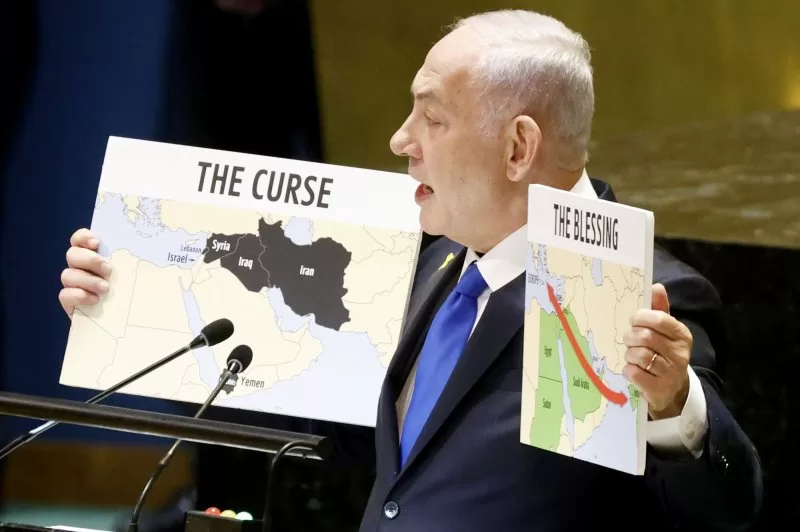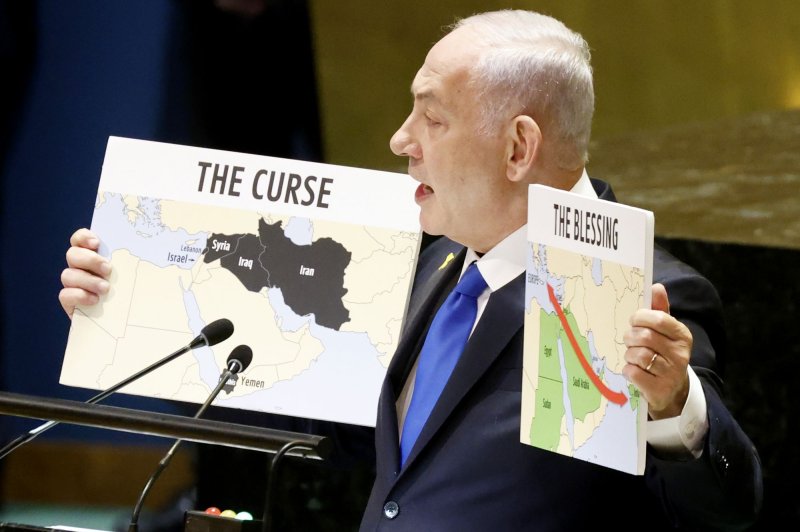1 of 4 | Prime Minister of Israel Benjamin Netanyahu holds two maps with messages when he speaks at the U.N. General Assembly 79th session General Debate in U.N. General Assembly Hall at the United Nations Headquarters on Friday in New York City. Photo by John Angelillo/UPI |
License PhotoSept. 27 (UPI) — Israeli Prime Minister Benjamin Netanyahu said the U.N. General Assembly has a choice to make between a blessing and a curse during the 79th assembly in New York City on Friday.
The blessing is a peace agreement in the Middle East that would also see Jewish and Arab partners create a land bridge of infrastructure connecting Asia to Europe. The curse is what he called an “arc of terror” led by Iran that would cover the Middle East from the Indian Ocean to the Mediterranean.
Netanyahu demonstrated these choices with a pair of maps depicting the “blessing” and “curse.”
“Which of these two maps that I showed you will shape our future? Will it be the blessings of peace and prosperity for Israel, our Arab partners, and the rest of the world?” Netanyahu asked. “Or will it be the curse in which Iran and its proxies spread carnage and chaos everywhere?”
The prime minister began his address by explaining why he came to the general assembly after not originally intending to. He said there were “lies and slanders leveled at my country by many of the speakers at this podium.”
“And here’s the truth. Israel seeks peace,” Netanyahu said. “Israel yearns for peace. Israel has made peace and will make peace again.”
Netanyahu’s address comes a day after Palestinian President Mahmoud Abbas took to the podium. Abbas exclaimed and repeated “We will not leave,” while calling for a cease-fire and humanitarian aid to Gaza. He also repeated that Israel is committing genocide in Gaza while creating conditions for a water shortage, starvation and the spread of disease.
Abbas said 40,000 people have been killed in Gaza, including more than 15,000 children. More than 100,000 have been injured and more than 100 entire families “no longer exist.”
“I’m not here to respond to the lies of the Israeli prime minister,” Abbas said, referencing Netanyahu’s address to the U.S. Congress in July.
Netanyahu told Congress that the Israeli Defense Force did not kill civilians in Gaza.
“I ask you, who is it then that killed more than 15,000 children of the 40,000 and an equal number of women and elderly persons,” Abbas said. “And who is it then that is continuing to kill them, I ask you?”
Netanyahu said Friday that “no army” has made the effort that Israel’s army has to minimize civilian casualties. Some efforts he described meant to curb civilian casualties include dropping flyers warning civilians to get out of harm’s way and warning them with millions of text messages.
“We see this moral confusion when Israel is falsely accused of deliberately targeting civilians,” he said. “We don’t want to see a single innocent person die. That’s always a tragedy.”
Netanyahu detailed the deadly conflict that has spanned nearly a year since the Oct. 7 Hamas attack. About 1,200 people were killed by Hamas, he said, and 251 were kidnapped. The victims included people from multiple countries. More than 150 hostages have been released but only 117 were still alive.
Netanyahu described Hamas as “savage enemies” and “murderous monsters,” ultimately being puppeteered and funded by Iran.
There were no delegates from Iran or Palestine at the assigned seats during Netanyahu’s speech. A large number of delegates from around the world left the hall as he took the podium.
“I have a message for the terrorists of Iran: if you strike us, we will strike you,” Netanyahu said. “There is no place in Iran that the long arm of Israel cannot reach. And that’s true of the entire Middle East.”
The Israeli prime minister also commented on the ongoing conflict with Hezbollah in Lebanon. He said Hezbollah has fired more than 8,000 rockets at Israeli towns, cities and civilians since Oct. 8. Some 60,000 Israelis fled their homes along the northern border.
Israel has also faced attacks from the Houthis in Yemen, who have launched 250 drone and missile attacks, including one on Thursday targeting Tel Aviv.
“As Israel defends itself against Iran in this seven-front war, the lines separating the blessing and the curse could not be more clear,” Netanyahu said.
Netanyahu called on all governments to support and join Israel in stopping Iran’s nuclear weapons program, warning that it will endanger every country across the world. He also urged the U.N. Security Council to reinstate sanctions against Iran.
Israel’s tactical success in the conflict with Hamas also came into focus. According to Netanyahu, the IDF has destroyed 23 of 24 Hamas battalions and 90% of its rocket arsenal. It has also eliminated key portions of its underground tunnel systems and infrastructure.
“To complete our victory, we are focused on mopping up Hamas’ remaining fighting capabilities,” he said. “We are taking out senior terrorist commanders and destroying remaining terrorist infrastructure. But all the while we remain focused on our sacred mission: bringing our hostages home.”
Some family members of Israeli hostages were in the gallery cheering and applauding throughout Netanyahu’s speech.
Abbas, on Thursday, laid out a proposal for what should be done in Gaza after the war is over, in what he called a “day after” proposal. He told the assembly that he is open to amending the proposal.
Abbas’ proposal calls for a permanent and comprehensive cease-fire in Gaza, a complete withdrawal by Israeli forces, urgent disbursement of humanitarian aid throughout Gaza and international protection for Palestinians. He also calls for a conference that would be used for Palestine and Israel to resolve their differences and guarantee security for both sides.
The proposal rejects any buffer zones in Gaza.
“We recognize the state of Israel. They do not recognize us,” Abbas said.
Abbas also pleaded for Palestine to be granted full membership in the U.N. It has been recognized as a sovereign state by the U.N. since June. The United States was the only member nation to vote down Palestine’s full membership in April, vetoing a resolution that would grant it statehood.
The Palestinian president argued that the United States has stood in the way of three U.N. Security Council draft resolutions for a cease-fire. He also placed responsibility on the United States for enabling the continued fighting by giving Israel weapons.
Abbas went on to say that it is Israel that should not be allowed membership in the U.N. He said he will submit a resolution to the General Assembly challenging its membership.
“Seventy-five percent of everything in Gaza has been fully destroyed,” Abbas said. “If Israel thinks it would get away from being held accountable and punished for these crimes it is delusional. The international community must immediately impose sanctions on Israel.”
Netanyahu claimed that the general assembly is a “swamp of anti-Semitic bile” that has disproportionately targeted Israel with condemnation since its inception.
“Today I tell President Abbas and all of you who would shamefully support that resolution, check your fanaticism at the door,” Netanyahu said. “The singling out of the one and only Jewish state continues to be a moral stain on the United Nations.”

